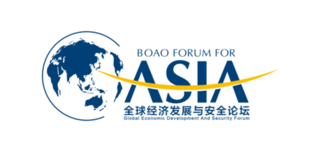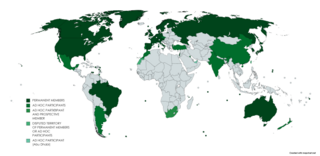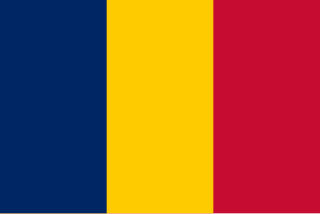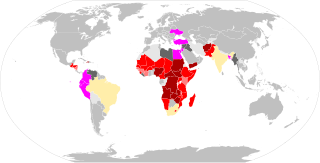Related Research Articles
The International Development Association (IDA) is a development finance institution which offers concessional loans and grants to the world's poorest developing countries. The IDA is a member of the World Bank Group and is headquartered in Washington, D.C. in the United States. It was established in 1960 to complement the existing International Bank for Reconstruction and Development by lending to developing countries which suffer from the lowest gross national income, from troubled creditworthiness, or from the lowest per capita income. Together, the International Development Association and International Bank for Reconstruction and Development are collectively generally known as the World Bank, as they follow the same executive leadership and operate with the same staff.

The least developed countries (LDCs) are developing countries listed by the United Nations that exhibit the lowest indicators of socioeconomic development. The concept of LDCs originated in the late 1960s and the first group of LDCs was listed by the UN in its resolution 2768 (XXVI) on 18 November 1971.

The heavily indebted poor countries (HIPC) are a group of 39 developing countries with high levels of poverty and debt overhang. Because of these factors, the International Monetary Fund (IMF) and the World Bank have classified them as eligible for special assistance.

The Boao Forum for Asia, initiated by 25 Asian countries and Australia, is a nonprofit that hosts high-level forums for leaders from government, business and academia in Asia and other continents to share their vision on the most pressing issues in this region and the world at large. Though its fixed address is in Bo'ao, Hainan province, China, its Secretariat is based in Beijing. The forum, sometimes known as the “Asian Davos”, takes its name from the town of Boao, located in China's southern Hainan province, which has been the permanent venue for its annual conference since 2002.

Paris Club is a group of major creditor countries aiming to provide a sustainable way to tackle debt problems in debtor countries.

The Extractive Industries Transparency Initiative (EITI) is a Norwegian-based organization that seeks to establish a global standard for the good governance of oil, gas and mineral resources. It seeks to address the key governance issues in the extractive sectors.

The individual member states of the African Union (AU) coordinate foreign policy through this agency, in addition to conducting their own international relations on a state-by-state basis. The AU represents the interests of African peoples at large in intergovernmental organizations (IGO's); for instance, it is a permanent observer at the United Nations' General Assembly.
Debt Justice is a UK-based campaigning organisation that exists to end unjust developing countries' debt and the poverty and inequality it perpetuates. The organisation’s activities include campaigning, advocacy, community organising and activism and aims to build collective power with people most affected by debt to demand a fair economy for all.
The G90, otherwise known as the Group of 90, is an alliance between the poorest and smallest developing countries, many of whom are part of the World Trade Organization (WTO). The G90 emerged as a strong grouping at the WTO’s Ministerial conference at Cancun in September 2003, taking common positions representing the largest number of countries, with 64 of the 90 countries in the G90 being members of the WTO. It is the largest trading body in the WTO, and it was formed as an umbrella body including the African, Caribbean and Pacific Group (ACP), the African Union, and the group of Least Developed Countries (LDC).

Hu Xiaolian is a Chinese economist and former Deputy Governor of the People's Bank of China and director of the State Administration of Foreign Exchange in China. In 2007, she was ranked 23rd on The Wall Street Journal's "The 50 Women to Watch 2007" list. In 2008, she was ranked fourth on The Wall Street Journal's "The 50 Women to Watch 2008" list and was referred to as "one of the most powerful people in the world".
The Global Partnership for Education (GPE) is a multi-stakeholder partnership that aims to strengthen global education. Hosted by the World Bank, GPE is the world's only partnership dedicated solely to funding education in developing countries.
The Halifax Initiative is a coalition of Canadian non-governmental organizations for public interest work and education on international financial institutions. Canadian non-governmental organizations formed the Halifax Initiative in December 1994 to ensure that demands for fundamental reform of the international financial institutions would be high on the agenda of the upcoming June 1995 Group of 7 meeting in Halifax. The Halifax Initiative is a coalition of development, environment, faith-based, human rights and labour groups.

Tourism is an important economic sector for many countries in Africa. There are many countries that benefit heavily from tourism like Kenya, Uganda, Algeria, Egypt, South Africa, Morocco, Tunisia, Ghana and Tanzania. The touristic particularity of Africa lies in the wide variety of points of interest, diversity and multitudes of landscapes as well as the rich cultural heritage. Also, an ecotourist industry is present in some African countries.

Despite several steps taken by the previous government in order to fight corruption in Zambia, there has not been a dramatic improvement in the public perception of anti-corruption efforts over the past years. Corruption remains pervasive in the country, yet in April 2014 the Business Anti-Corruption Portal reported that the situation in Zambia is relatively better than that of other countries in the region.
Multilateral Debt Relief Initiative (MDRI) was approved on June 2005 by the finance ministers of the G8 during the 31st G8 Summit, held at Gleneagles, Scotland. MDRI is different to HIPC, but operationally related. Countries in the termination point get full relief of their debt with IMF, International Development Association (IDA) and the African Development Bank (AfDB). MDRI was approved for encouraging debtor countries to continue their political reforms. For reasons of equal treatment of Low Income Countries (LIC) the relieved debts were counted when new ancillary remedies were guaranteed by IDA and AfDB. G8 members committed themselves to compensate IDA and AfDB refluxes with further remedies. These compensations will be shared among IDA and AfDB beneficiary countries according to the efforts they make.

Corruption in Chad is characterized by nepotism and cronyism. Chad received a score of 20 in the 2023 Transparency International Corruption Perceptions Index on a scale from 0 to 100. When ranked by score, Chad ranked 162nd among the 180 countries in the Index, where the country ranked first is perceived to have the most honest public sector. For comparison with worldwide scores, the best score was 90, the average score was 43, and the worst score was 11. For comparison with regional scores, the average score among sub-Saharan African countries was 33. The highest score in sub-Saharan Africa was 71 and the lowest score was 11.
Debt-trap diplomacy is a term to describe an international financial relationship where a creditor country or institution extends debt to a borrowing nation partially, or solely, to increase the lender's political leverage. The creditor country is said to extend excessive credit to a debtor country with the intention of extracting economic or political concessions when the debtor country becomes unable to meet its repayment obligations. The conditions of the loans are often not publicized. The borrowed money commonly pays for contractors and materials sourced from the creditor country.

During the COVID-19 pandemic, food insecurity intensified in many places. In the second quarter of 2020, there were multiple warnings of famine later in the year. In an early report, the Nongovernmental Organization (NGO) Oxfam-International talks about "economic devastation" while the lead-author of the UNU-WIDER report compared COVID-19 to a "poverty tsunami". Others talk about "complete destitution", "unprecedented crisis", "natural disaster", "threat of catastrophic global famine". The decision of the WHO on 11 March 2020, to qualify COVID as a pandemic, that is "an epidemic occurring worldwide, or over a very wide area, crossing international boundaries and usually affecting a large number of people" also contributed to building this global-scale disaster narrative.

Third Conference of the Non-Aligned Movement on 8–10 September 1970 in Lusaka, Zambia was the third conference of the Non-Aligned Movement. A preparatory meeting of Foreign Ministers drafted a number of resolutions which were considered by the Summit Conference. President of Zambia Kenneth Kaunda opened the conference by underlining non-alignment as "the natural choice at the time of increased hostility created by ideological conflicts in the bipolar world"
References
- 1 2 3 "Debt Service Suspension Initiative". WB. The World Bank. Retrieved 21 May 2024.
- 1 2 3 "Debt Service Suspension Initiative: Q&As". WB. The World Bank. Retrieved 21 May 2024.
- ↑ "Debt service suspension initiative for the poorest countries-Term sheet". Trésor de France. Retrieved 22 May 2024.
- 1 2 Biswajit Dhar (8 September 2023). "Why G20's debt-relief strategy is failing" . Retrieved 21 May 2024.